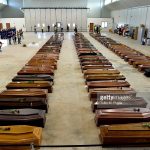The Refugee Crisis: Hospitality in The Midst of Global Indifference
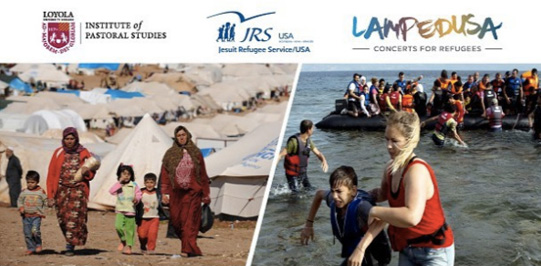
Victor Hugo once wrote that “contemplating shadows is a serious thing.” And to a large degree, I think that’s what this panel is an effort to do, to fix our collective gazes upon marginalized communities who are living at the existential peripheries of an interconnected and interdependent world. That is to say, to those dwelling in the shadows.
Hopefully, we all likely realize that this panel and the Jesuit Refugee Services concert series with which it is connected are intentionally tied to Lampedusa for a very specific reason: It was there that in the pope’s first official visit outside of Rome, he lamented the “globalization of indifference” which continues to fail to turn its sights upon the countless refugees and displaced persons around the world in search of security, opportunity, and dignity.
In case some people here are not aware, the tiny island off the coast of Sicily is an entry point for the desperate and destitute to gain a first foothold into Europe. People living on the precipitous edge of subsistence ex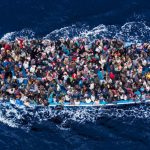 istence with nothing more than they can carry are common images from this rocky outcrop in the Mediterranean, as are rows of coffins of recovered bodies, and the wreckage of any kind of floating vessel you can imagine littering the tiny island. The highlight of the trip was the pope’s memorial and comments given in a makeshift “boat cemetery.” The destabilization of places like Libya and Tunisia, as well as further south in Africa and east towards Egypt and Syria have led tens of thousands of people to risk what is now the deadliest migratory route in the world across the waves, where hundreds die at a time. And yet, so many in the world react as if this is not of their concern….. there is, as the pope put it, a “globalization of indifference.”
istence with nothing more than they can carry are common images from this rocky outcrop in the Mediterranean, as are rows of coffins of recovered bodies, and the wreckage of any kind of floating vessel you can imagine littering the tiny island. The highlight of the trip was the pope’s memorial and comments given in a makeshift “boat cemetery.” The destabilization of places like Libya and Tunisia, as well as further south in Africa and east towards Egypt and Syria have led tens of thousands of people to risk what is now the deadliest migratory route in the world across the waves, where hundreds die at a time. And yet, so many in the world react as if this is not of their concern….. there is, as the pope put it, a “globalization of indifference.”
“Am I my brother’s keeper?” they seem to echo Cain in callously asking.
Their ambivalence is now being superseded in many quarters by outright hostility.
That day the pope made clear:
“The blood of the lifeless cries out to me, says the Lord. What have you done?
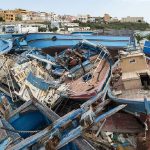 This is not a question directed to others; it is a question directed to me, to you, to each of us. These brothers and sisters of ours were trying to escape difficult situations to find some serenity and peace; they were looking for a better place for themselves and their families, but instead they found death. How often do such people fail to find understanding, fail to find acceptance, fail to find solidarity. And their cry rises up to God!”
This is not a question directed to others; it is a question directed to me, to you, to each of us. These brothers and sisters of ours were trying to escape difficult situations to find some serenity and peace; they were looking for a better place for themselves and their families, but instead they found death. How often do such people fail to find understanding, fail to find acceptance, fail to find solidarity. And their cry rises up to God!”
What then, if any, is the responsibility of a Jesuit, Catholic institution of higher ed, such as Loyola, to address this “indifference”? Are we called to “contemplate these shadows” of their difficult plight, and if so, what resources, whether intellectual, theological, or material do we have to respond?
First, Christians are given an unambiguous mandate to care for the widow, oppressed, and exile in their scriptures. The xenophobia (fear of foreigners, strangers, aliens, travelers) that is bandied about in our political discourse is rarely counterbalanced by the antidote put forward in the Old and New Testaments. There we find the explicit call to “philoxenia” (love of foreigners, strangers, aliens, travelers). In fact, the entire Christian experience is one of pilgrimage-movement-exile, the first Christians were called practitioners of The Way, all of religious life can in some sense be seen, as Thomas Tweed has put it, as the sort of complementary mutually-informing experiences of crossing and dwelling. We move from darkness toward light, fro m sin toward redemption, from history toward eternity, a process of unfolding, migration, movement. And in so doing we find resettlement, home, community, “our true native land to be” as the English translation of St. Thomas’s O Salutaris Hostia puts it. So we, as the inheritors of the Christian and Ignatian tradition, are in fact a people of exile, a people received and interwoven into and in solidarity with: a wider vista of community than the provincial and nativist among us would like us to admit. We are all refugees, who seek shelter in the transcendent and in the experience of authentic humanity. Whoever receives you, receives me, says Christ. And Matthew’s gospel makes clear that on the Last Day we will be judged according to how we treat the exile. How prophetic do Jesus’s words ring out when read metaphorically with the rise of today’s majority world: “At the judgment, the queen of the south will rise up against this current generation and condemn it.”
m sin toward redemption, from history toward eternity, a process of unfolding, migration, movement. And in so doing we find resettlement, home, community, “our true native land to be” as the English translation of St. Thomas’s O Salutaris Hostia puts it. So we, as the inheritors of the Christian and Ignatian tradition, are in fact a people of exile, a people received and interwoven into and in solidarity with: a wider vista of community than the provincial and nativist among us would like us to admit. We are all refugees, who seek shelter in the transcendent and in the experience of authentic humanity. Whoever receives you, receives me, says Christ. And Matthew’s gospel makes clear that on the Last Day we will be judged according to how we treat the exile. How prophetic do Jesus’s words ring out when read metaphorically with the rise of today’s majority world: “At the judgment, the queen of the south will rise up against this current generation and condemn it.”
In addition to these biblical mandates, the whole history of Catholic Social Teaching prioritizes the necessity of working for justice, peace, and the common good, with a preferential option for the poor. Theologians like Gutierrez and Boff have consistently argued that the primary issues of our day for all men and women of good will do not revolve around those described as “non-believers” so much as those who societal forces name as “non-persons.” Chief among these are the staggering number of refugees and displaced persons, who the powers that be continue to insist are invisible, irredeemable, and thus, inadmissible (anywhere).
Our commitment cannot stem from a patronizing sense of charity, drawn from privileged largesse, but as the Arrupe College initiative here at Loyola makes clear, it is a moral imperative that all in our community work with, learn from, and better understand ourselves through solidarity with marginalized communities…much more than simply a mandate to “help” the disadvantaged.
However, in this vein, I may surprise some of you here, because I do in fact think we need a wall. A “big, beautiful, powerful” wall. Completely impenetrable. It’s the only way we can make our people great again, recover our true patrimony and protect our historic culture. And, I agree that we ought not be the ones responsible for its construction, someone else ultimately will be the one underwriting it, and be willing to do so to boot.
“For the Lord said to Jeremiah: If you utter what is worthwhile and not what is vile then I will make you unto this people into  a fortified wall of bronze; they shall fight against you, but they shall not prevail over you. For I am with you, to save you and deliver you, says the Lord. I will deliver you out of the hand of the wicked, and redeem you from the grasp of the ruthless.” (Jeremiah 15).
a fortified wall of bronze; they shall fight against you, but they shall not prevail over you. For I am with you, to save you and deliver you, says the Lord. I will deliver you out of the hand of the wicked, and redeem you from the grasp of the ruthless.” (Jeremiah 15).
Thus we are called, as both Christian and Americans, to serve as a prophetic “wall of bronze” against hatred, racism, fear of the unknown or protectionism. Hardness of heart and narrowness of mind are not excuses for putting polic
ies ahead of people.
We must stand firm against those who tell us to pay no attention to that man behind the curtain, to the myopia infecting a world that wants desperately to somehow un-remember or rationalize away those troublesome words on the statue of liberty, forged in the crucible of a world torn asunder by hatred and division:
Not like the brazen giant of Greek fame,
With conquering limbs astride from land to land;
Here at our sea-washed, sunset gates shall stand
A mighty woman with a torch, whose flame
Is the imprisoned lightning, and her name
Mother of Exiles. From her beacon-hand
Glows world-wide welcome; her mild eyes command
The air-bridged harbor that twin cities frame.
“Keep, ancient lands, your storied pomp!” cries she
With silent lips. “Give me your tired, your poor,
Your huddled masses yearning to breathe free,
The wretched refuse of your teeming shore.
Send these, the homeless, tempest-tost to me,
I lift my lamp beside the golden door!”
Do we have the courage to stand as a brass wall against those intellectual vandals who rush headlong toward this New Colossus with pitchforks and crowbars to deface our national identity? Is America (in relationship with her allies around the world) still “the mother of exiles”? How do we balance legitimate concerns about national
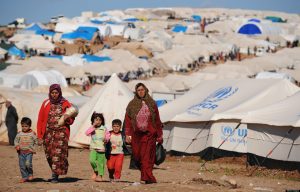
security and internal peacekeeping with those “tired and poor, homeless and tempest-tossed” we pledged to welcome, without fear-mongering allegations that they could not be properly “vetted?” The answer lies in speaking what is worthwhile and not what is vile.
As members of the Loyola community we are called to recognize the value and dignity of all God’s people, especially the most vulnerable, the “bruised hurting and dirty” — the same adjectives Pope Francis uses to describe the church as a “field hospital” can be seen in the faces of Syrian children in shelters and ambulances. We must offer our time, talent, and treasure in support of those in the shadows of death. We cannot fall prey to false narratives where all victims of war and systems of violence are equal, but some victims are more equal than others, to borrow an Orwellian phrase. Can Christians see in the church and its partners like Loyola (of course enthusiastically open to people of all faiths and none) a reflection of those divine attributes we acknowledge with all children of Abraham: a defense for the defenseless, a refuge in the day of distress, a fortress, a shield and a stronghold? For the breath of the ruthless, as Isaiah puts it, is no more than “rain against a wall.”
Let us always remember that we are that wall, and thus Make Christian Witness Great Again.
-Dr. Michael Canaris | Profesor at Loyola University Chicago, Institute of Pastoral Studies | Theologian
